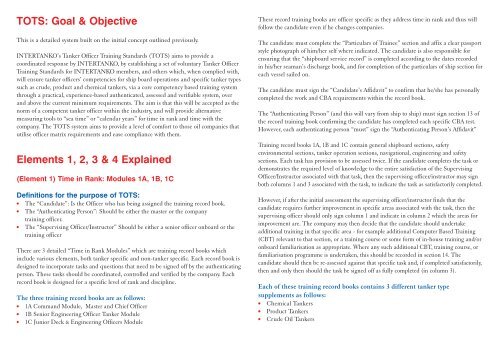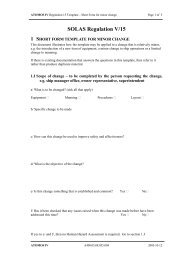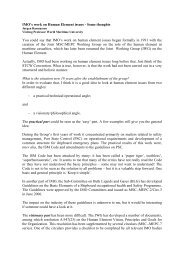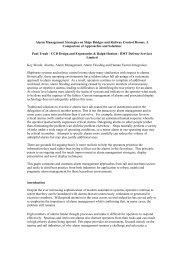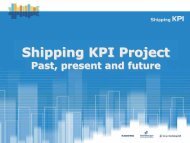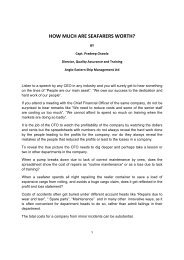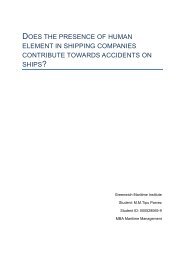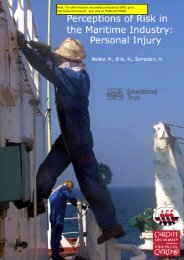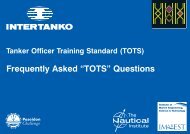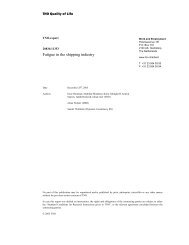Frequently Asked “TOTS” Questions
Download PDF - Alert!
Download PDF - Alert!
- No tags were found...
Create successful ePaper yourself
Turn your PDF publications into a flip-book with our unique Google optimized e-Paper software.
TOTS: Goal & Objective<br />
This is a detailed system built on the initial concept outlined previously.<br />
INTERTANKO’s Tanker Officer Training Standards (TOTS) aims to provide a<br />
coordinated response by INTERTANKO, by establishing a set of voluntary Tanker Officer<br />
Training Standards for INTERTANKO members, and others which, when complied with,<br />
will ensure tanker officers’ competencies for ship board operations and specific tanker types<br />
such as crude, product and chemical tankers, via a core competency based training system<br />
through a practical, experience-based authenticated, assessed and verifiable system, over<br />
and above the current minimum requirements. The aim is that this will be accepted as the<br />
norm of a competent tanker officer within the industry, and will provide alternative<br />
measuring tools to “sea time” or “calendar years” for time in rank and time with the<br />
company. The TOTS system aims to provide a level of comfort to those oil companies that<br />
utilise officer matrix requirements and ease compliance with them.<br />
Elements 1, 2, 3 & 4 Explained<br />
(Element 1) Time in Rank: Modules 1A, 1B, 1C<br />
Definitions for the purpose of TOTS:<br />
● The “Candidate”: Is the Officer who has being assigned the training record book.<br />
● The “Authenticating Person”: Should be either the master or the company<br />
training officer.<br />
● The “Supervising Officer/Instructor” Should be either a senior officer onboard or the<br />
training officer<br />
There are 3 detailed “Time in Rank Modules” which are training record books which<br />
include various elements, both tanker specific and non-tanker specific. Each record book is<br />
designed to incorporate tasks and questions that need to be signed off by the authenticating<br />
person. These tasks should be coordinated, controlled and verified by the company. Each<br />
record book is designed for a specific level of rank and discipline.<br />
The three training record books are as follows:<br />
● 1A Command Module, Master and Chief Officer<br />
● 1B Senior Engineering Officer Tanker Module<br />
● 1C Junior Deck & Engineering Officers Module<br />
These record training books are officer specific as they address time in rank and thus will<br />
follow the candidate even if he changes companies.<br />
The candidate must complete the “Particulars of Trainee” section and affix a clear passport<br />
style photograph of him/her self where indicated. The candidate is also responsible for<br />
ensuring that the “shipboard service record” is completed according to the dates recorded<br />
in his/her seaman’s discharge book, and for completion of the particulars of ship section for<br />
each vessel sailed on.<br />
The candidate must sign the “Candidate’s Affidavit” to confirm that he/she has personally<br />
completed the work and CBA requirements within the record book.<br />
The “Authenticating Person” (and this will vary from ship to ship) must sign section 13 of<br />
the record training book confirming the candidate has completed each specific CBA test.<br />
However, each authenticating person “must” sign the “Authenticating Person’s Affidavit”<br />
Training record books 1A, 1B and 1C contain general shipboard sections, safety<br />
environmental sections, tanker operation sections, navigational, engineering and safety<br />
sections. Each task has provision to be assessed twice. If the candidate completes the task or<br />
demonstrates the required level of knowledge to the entire satisfaction of the Supervising<br />
Officer/Instructor associated with that task, then the supervising officer/instructor may sign<br />
both columns 1 and 3 associated with the task, to indicate the task as satisfactorily completed.<br />
However, if after the initial assessment the supervising officer/instructor finds that the<br />
candidate requires further improvement in specific areas associated with the task, then the<br />
supervising officer should only sign column 1 and indicate in column 2 which the areas for<br />
improvement are. The company may then decide that the candidate should undertake<br />
additional training in that specific area - for example additional Computer Based Training<br />
(CBT) relevant to that section, or a training course or some form of in-house training and/or<br />
onboard familiarisation as appropriate. Where any such additional CBT, training course, or<br />
familiarisation programme is undertaken, this should be recorded in section 14. The<br />
candidate should then be re-assessed against that specific task and, if completed satisfactorily,<br />
then and only then should the task be signed off as fully completed (in column 3).<br />
Each of these training record books contains 3 different tanker type<br />
supplements as follows:<br />
● Chemical Tankers<br />
● Product Tankers<br />
● Crude Oil Tankers


